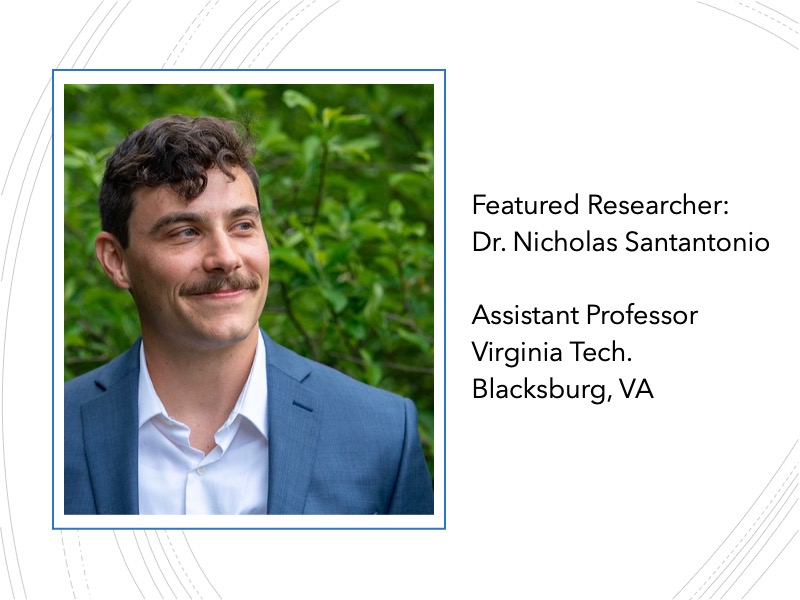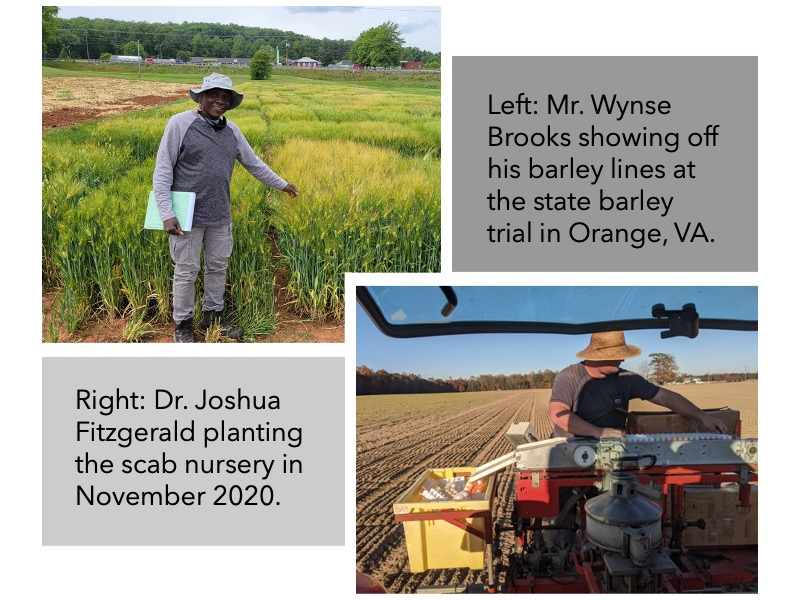Featured Researcher Bio - Nicholas Santantonio September 2021

Meet Nicholas Santantonio, Ph.D., an assistant professor, at Virginia Tech. Dr. Santantonio is a newly funded PI with the U.S. Wheat and Barley Scab Initiative. His projects focus on breeding soft winter wheat and barley for FHB resistance and are funded under the Barley Coordinated Project and Variety Development and Host Resistance Southern Winter Wheat categories of the RFP.
USWBSI: Briefly share some background on yourself and your research program.
Nicholas Santantonio: I recently took over as the lead of the small grains breeding and genetics program at Virginia Tech in fall of 2020. I received a Bachelor's and Master's at New Mexico State University working in alfalfa breeding before continuing to a PhD at Cornell University in small grains breeding and a postdoc focused on quantitative genetics. My predecessor at Virginia Tech, Dr. Carl Griffey, built a world class breeding program, producing new varieties of winter wheat and barley with good agronomic performance and disease resistance for over thirty years. I hope to bring new technologies into this successful breeding program to further accelerate the production of new varieties to meet the challenges of a changing climate. The program has been a part of the USWBSI since its inception, and continues to be a key contributor. Joshua Fitzgerald currently serves as the scab breeder in the program, leading the USWBSI funded breeding projects at Virginia Tech.
USWBSI: What novel techniques are being implemented in your research program?
Nicholas Santantonio: We are working to incorporate high-throughput phenomics (aerial multispectral imaging) with high-dimensional genomics (genome-enabled prediction and selection) in breeding decision making. This includes modeling the genetic variability of longitudinal traits like growth and development to understand how differential plasticity leads to differential performance across changing environments. These efforts in soft wheat are funded through our partnership with Cornell University, New Mexico State University, BASF and Limagrain on a $1.6 million collaborative grant from Foundation for Food & Agriculture Research (FFAR) Seeding Solutions, "Scalable breeding for plant growth to address the challenges of climate change". We are also working to determine how genetic variability in growth and development leads to malting quality characteristics in barley through funding from the Center for Advanced Innovation in Agriculture (CAIA) at Virginia Tech.
Research on scab resistance is ongoing through funding from the USWBSI, including marker assisted selection and genomic prediction and selection for scab traits. The project will be moving toward multi-trait prediction and selection indices for scab traits, as well as new methods to quantify genetic resistance to disease progression and spread. The program is eager to research new ways to improve scab resistance by incorporating time as a factor, where differential genetic regulation of disease progression and spread can be used to limit impacts of FHB epidemics when they do occur.
USWBSI: What excites you most about your research and current position?
Nicholas Santantonio: I love the broad impact this program has, from doing basic science on the genetic architecture of quantitative traits, to making seed products for farmers. We have a diverse set of markets that we serve, and release new varieties of soft wheat, hard wheat, feed and food barley on a yearly basis. Under the thirty-year veteran lead of Mr. Wynse Brooks, the program has begun breeding new malting barleys adapted to the east coast to help build the local malt supply chain to feed the booming craft beer industry. These efforts include collaborations with maltsters and brewers to evaluate eastern grown malt as a viable product for local craft brewers. Virginia Tech's first malting variety, 'Avalon', was released by Mr. Brooks in 2020 with good malting characteristics, agronomics and disease resistance, including moderate resistance to scab. These projects are actively training new graduate students and postdocs to leverage high throughput phenomics and genomics for the plant breeding programs of tomorrow.
If you are interested in learning more about Dr. Nicholas Santantonio you can view his faculty page and reach him via email.
Is your research aligned with the mission of the U.S. Wheat and Barley Scab Initiative? The FY22 USWBSI Request for Pre-Proposals is now in progress. USWBSI will be accepting pre-proposals until September 21. Check out the details for the FY22 USWBSI RFP under the Research Area Individual Projects Category today! (All other categories required a Letter of Intent and are now closed.)

You can also check out the series of previous USWBSI Featured Researchers.
